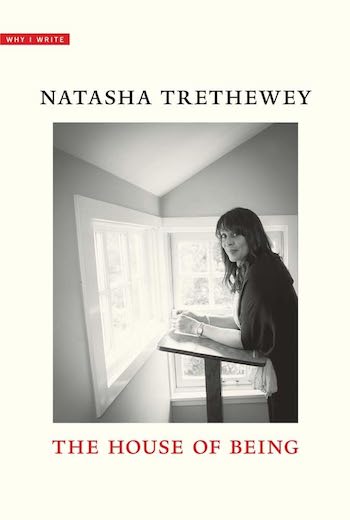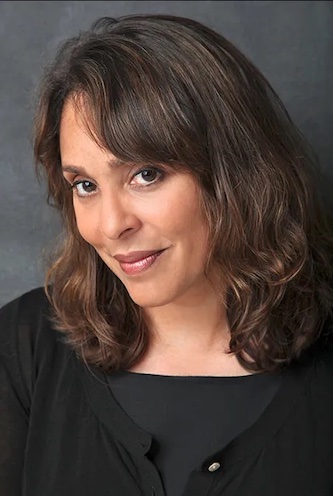Book Review: Natasha Trethewey’s “The House of Being” — Safeguarding the Imagination
By Ann Leamon
Protecting the imagination — whether our own or others — means encouraging questions about whose voice isn’t being heard and why, whose words are being erased, and whose stories unsettle the status quo.
The House of Being by Natasha Trethewey. Yale University Press, 96 pages, $18.
 “Why do you write?” This question is often asked to writers by others and by themselves. Natasha Trethewey, in her slim bound essay The House of Being, part of Yale’s Why I Write series, answers this question in an elegant and deeply personal exploration of her life and how it has shaped her art.
“Why do you write?” This question is often asked to writers by others and by themselves. Natasha Trethewey, in her slim bound essay The House of Being, part of Yale’s Why I Write series, answers this question in an elegant and deeply personal exploration of her life and how it has shaped her art.
Trethewey’s literal “house of being” is her grandmother’s, a double shotgun house in Gulfport Mississippi at the corner of Jefferson Avenue and Highway 49, the legendary “Blues Highway.” Unpeeling the layers of this home begins by breaking down the paradoxes of the address: the intersection of a slave-owning, slave-impregnating president with the rise of a quintessentially Black music genre. This is where Trethewey, a biracial poet who won the Pulitzer Prize and was U.S. Poet Laureate twice, spent the most cherished years of her youth. And it is a tension at the heart of her creativity.
From her earliest days, Trethewey grappled with coming to terms with the sentiments of poetry admired by white culture and the grittier lessons learned from living in the American South. Her father, a white poet, continually recited great verse to her: “Yeats, Hayden, Wordsworth…—all in the cadences of my father’s resonant voice. …I trembled with excitement at the sounds.” At the same time, Trethewey saw the merit of craft, appreciating the mastery of precision and detail exercised by her Black grandmother, a successful self-employed seamstress. She also discovered linguistic nuances as she listened to her mother and grandmother code switch. At home they spoke “the black vernacular—intimate, familial”; amid the white population their language changed. Trethewey’s father wanted her to abandon Black English, but she refused “because I loved the people who spoke it.”
She became preternaturally alert to the ironic value of intersections, such as her grandmother’s address, her own birth on the hundredth anniversary of Confederate Memorial Day, and others that appear in her poetry. “…[I]t’s a kind of magical thinking to look back and assign meaning to a constellation of circumstances,” Trethewey writes. Intriguing as she finds those real life conjunctions, Trethewey refuses to accept their power to shape her identity or limit her art: “I’ve needed to create the narrative of my life — its abiding metaphors — so that my story would not be determined for me.”
Trethewey describes how those around her tried to dissuade her from being a writer. Of course, this discouragement of Black expression is nothing new. Thomas Jefferson posited that “among the blacks is misery enough, God knows, but no poetry.” In his memoir Black Boy, Richard Wright recalls a white woman telling him: “You’ll never be a writer. Who on earth put such ideas into your nigger head?” Trehewey’s most traumatic experience along those lines came when, as a high school student, she declared “I’m going to be a writer!” to her mother, Gwendolyn, and stepfather, a Black Vietnam War vet. Her stepfather derided the dream, but Gwendolyn defended her daughter: “She. Will do. WHATEVER. She wants.”

Natasha Trethewey Photo: Nancy Crampton
Trethewey knew that her mother would be beaten that night for her defiance. Only a few years later, Gwendolyn would be shot and killed by her now ex-husband. The murder sent Trethewey into a writing drought that would last for several years. Eventually, “the absolute need to articulate the depths of that trauma, the facts of it and the way it connected in my psyche to the legacy of White Supremacy…would lead me back to poetry… I had to write lest the twin pulls of my existential wounds destroy me.”
Trethewey achieved a vital step in healing by writing the poems in her Pulitzer Prize-winning book, Native Guards, which was inspired by the freed slaves who fought for the Union in the Civil War, guarding Confederate prisoners on Mississippi’s Ship Island. Now a state park, Trethewey and her grandmother picnicked there every Fourth of July. The treasonous Confederate prisoners are memorialized; the Black Union soldiers who died there are not. Trethewey writes, “I began work on the Native Guards intending only to reinscribe their history into our collective cultural memory, but the act of writing held the mirror up not only to my nation but also to myself.” Her collection represents an examination of yet another crossroads: “at the intersection of personal and public history, erasure and memorization, and vernacular and classic traditions.”
Another intersection: Trethewey both resists the power of received poetic forms — the sonnet, ghazal, villanelle, pantoum — and employs them in her work. “…[T]he traditional forms,” she writes, “…can help in the dismantling of a monolithic narrative based on racial hierarchy, willed amnesia, and selective remembering.” By putting the “new wine” of her previously silenced experience of racism, sexism, and trauma into the “old bottle” of the classic forms, it could be argued, she creates a linguistic/cultural Trojan Horse. Readers pay closer attention to the poem’s content because they are not distracted by a startling new form.
Trethewey concludes that poetry is a form of protection, personal and cultural: “Writing is a way of creating order out of chaos, of taking charge of one’s own story… pushing back against received knowledge and guarding the sanctity of the dwelling place of the imagination, that place of first permission.” That notion of first permission describes the elemental responsibility (one could almost argue morality) of a member of the writing community. Protecting the imagination — whether our own or others — means encouraging questions about whose voice isn’t being heard and why, whose words are being erased, and the fate of stories that are uncomfortable to the status quo. Trethewey says that these important investigations may not only result in art, but drive research projects and innovative public policies whose goal is to protect and honor the imaginings and, by extension, the realities of the marginalized and powerless.
Trethewey’s poetry, with its close attention to words, meanings, and rhythms, her elegant and ecumenical use of received forms, urges us to expand and deepen our intellectual perspectives, to open ourselves up to elemental questions. House of Being articulates a key part in the writer’s mission: to move us beyond the question of ‘Why I write’ to contemplate ‘How I think,’ and even ‘What I know.’ Given the omissions of conventional history and culture, we rarely know the whole story.
Ann Leamon’s writing spans the genres and has appeared in Harvard Review, Tupelo Quarterly, MicroLit Almanac, North Dakota Quarterly, and River Teeth, among others. She holds a BA (Honors) in German from Dalhousie University/University of King’s College, an MA in Economics from the University of Montana, and an MFA in Poetry from the Bennington Writing Seminars. She has attended residencies at the Prospect Street Writing House, Blackfly Writing Program at the Haystack School, Stonecoast Writers Program, and Dorland Mountain Artists Colony. She lives on the coast of Maine with her husband and a Corgi-Lab mix.

Brilliant and thought provoking
Superb, Ann. Thank you for bringing us this new-to-me voice so eloquently.
How you find the time to churn out something like this (so well done!) with everything else you do never hesitates to baffle me. i honestly feel i needn’t read the book. i feel i already have.